Friday, December 30, 2005
Last Day to Save on Bookstores
Monday, December 26, 2005
Jim Elliot's Story about to hit big screen?

In January 1956, five men dared to make contact with the most savage tribe in history, and their story changed lives around the world. Fifty years later the story, told from the tribe's perspective, will reach another generation in theaters January 2006.
I found out recently about a new movie due out in the first month of the new year, 2006. Evidently it will be somehow a retelling of the Jim Elliot story. Jim was a missionary determined to take the gospel to the Auwca Indians of Ecquador. He and his team were brutally murdered just days after landing in the jungle. When I have read Jim Elliot's biography and his personal journal, you cannot help but sense a love for Christ and for men. I have also been blessed to hear his wife, Elizabeth on the radio.
Jim Elliot said, "He is no fool who gives what he cannot keep to gain what he cannot lose."
I understand that this movie is a representation of the book "Through the Gates of Splendor" by Jim's widow, Elizabeth. If so, I am hopeful that God will use it to move many men and women into the fields for harvest.


Are you a part of the Calvinist Revolution?
The following is the short email.
While listening to a normal Italian radio station this morning -- "Radio DJ" -- one of the announcers started talking about cultural religious practices. That's not at all uncommon here, but what I heard this morning made stop and think.
The man made special note of the fact that, in his opinion, from the standpoint of religion, Italy has advanced farther than other nations of the world -- "even other Catholic nations" -- in that pilgrimages, etc. -- "to places like Lourdes, for example" -- are not obligatory. Italian Catholics can go to Lourdes, or not, as they please. "And that's why church attendance in Spain is so high."
He was obviously getting into deep water by then, and realized he was making Italian religion seem light and almost meaningless, as if he were saying, "Italians can do what they want, and nobody cares."
In order to save himself, he uttered the following: "And this is the best way to prevent the Calvinist revolution which has occurred in so many other countries." (!)
How interesting that, on the spot, and under the gun, a phrase like "the Calvinist revolution" should be broadcast nationwide.
I spare you my personal comments, but it does make one stop and think.
Thoughts on Christmas

Ok, I know that The holiday itself has come and gone and I for one enjoyed the time off and also the time with family and food. I said earlier in the month that I would attempt to put down some of my thoughts concerning Christmas. I use to hold to the "traditional" celebrations of Christmas. However, more and more I don't see the need for them or the seemingly hypocritical way Christmas is presented. Please don't take my words as directed towards any specific individual. I am speaking generally here as a man who is seriously trying to examine the "reason(s) for the season". My attempt is not to set myself up as a Pharisee and command everyone to abstain from things in order to be holy. Our holiness is from the Lord. However, that holiness does present itself in various practical ways and that is what I am implying here. I have not "arrived", but do offer these things for those who might not see a problem with Christmas or with some of the practices and traditions associated with it.
I recall a conversation I had recently with a gentleman whom I consider to be a very godly man. I witness him on a daily basis living a godly life. However, he was extremely upset about the left's move in this country to take away any reference to Christ in Christmas. He was just as adament that Christians should stand up and be counted and that they should oppose such things including the commercialization of Christmas. To him, Christmas was a Christian holiday and that if you didn't stand up in opposition to those looking to put up "Happy Holidays" instead of "Merry Christmas", then you would certainly be in trouble when they came in your house and told you what you could and couldn't teach your children. I was left sort of looking at him with that, well you know, ears perked up kind of head tilted dog look.
I explained to him that not all Christians observe Christmas. We have sound reasons for not doing so. It is not that we deny the Incarnation, nor is it that we are Scrooges who do not wish to enjoy special days with family and friends. In fact, most who would oppose the Christmas celebrations do get together with family and friends and spend time with one another around the table and home. Christmas' history began apart from apostolic teaching. It is not authentically and primarily Christmas. One can be a believer in the Lord Jesus Christ and not celebrate Christmas. By the way, the left, and sadly many on the right, are trying to tell us what to teach our children, which does come down to biblical authority. We specifically do not observe Christmas because of the trappings associated with it. Let me explain.
First and foremost, we end up engaging in something that is specifically not commanded in the Scripture. This is where it gets tricky for some people. I don't mean to imply that we shouldn't preach, teach, or pray recognizing the incarnation of God in Jesus Christ. I do not mean we should not make mention of it with our children. What I mean by that is that the Scripture is clear about what we should remember and that is the Lord's Death. He clearly instituted the Lord's Table as a reminder of it and He said that as often as we did it we did it in remembrance of Him. What is amazing to me is that most churches don't like the term often used there. Therefore, they do it once or twice a year or once a quarter. Our assembly remembers the Lord's Death each week. After all, it is the very reason that we come together.
I have been told that each week can make the Lord's Table seem common place. That is true. It can. Thus there should be warning and examination each day of each week as to whether or not we rightly discern the Lord's body and whether we judge ourselves worthy to partake (in the language of Paul). In all honesty this could be said of teaching and preaching and singing and praying, but we don't only do those things at select intervals during the year.
As we assembled yesterday in our home we remembered the promise of God in Genesis 3:15 in which there was the first declaration (the proto evangelion) of the Messiah who would crush the head of the serpent. We recalled that by the end of Genesis God, through Jacob, prophesied the time frame in which the Messiah would come (49:9-10). We recently went through Daniel and I quoted some of the sections that we studied in reference to the coming, work, and establishment of the kingdom of the Messiah along with a specific time in which it would take place. We recalled the birth of Christ from the gospels and noted that Paul defined His coming in the "fullness of time" (Gal. 4:4-5). We also spoke to Jesus giving the very reason that He came before Pilate in John's gospel (18:37)
"You say rightly that I am a king. For this cause I was born, and for this cause I have come into the world, that I should bear witness to the truth. Everyone who is of the truth hears My voice."
Earlier in the same section we noted that the scepter had departed from Judah, for the Jews could no longer lawfully execute capital punishment (18:30-32). Finally I made the following comments:
Christ was not born so that we could have a warm fuzzy experience.
He did not manifest Himself in the flesh so that we could decorate trees in our homes (spawned by pagan idolatry) with trinkets of His wonderful grace.
God did not become incarnate so that we would follow after the lusts of the flesh in an overindulgence of gift giving.
He was not born of a virgin in order that His people could mix His holiness with pagan traditions thinly veiled in Christian terms.
No, He was born that He should bear witness of the truth and that He should die to vindicate the name of God and rescue God's people.
It is true, that there is no Calvary without a Bethlehem. But Christ did not come specifically for Bethlehem, He came for Calvary. I do not mean to imply that Bethlehem was not important, nor do I mean to imply that the virgin birth was not important. They were because God said those things would be accomplished. They are part of the very fabric of biblical prophecy concerning the Messiah. However, they were the signposts, if you will, which would give authenitcation to the person who was the Messiah. This should give us cause for joy and pleasure, exalting in the supreme wisdom of God in sending for His Son, through a sinless birth, living a sinless life, and dying a sinless death in the place of sinful men, even me, the most unworthy sinner.
I could take the opportunity to address the many traditions associated with the season and their pagan origins. However, anyone who reads this could easily access that information if they really are interested in the truth. One of those traditions however, is that we end up tying ourselves to a date of December 25th as the birthday of Christ, when most Bible students understand that He was more likely born in the Fall. Should we mix the error of the date with the truth knowingly? We end up following the traditions of Rome, while calling ourselves Protestant. The question I have is this: evaluate what you did on December 25th. Were you totally engaged in the celebration of what God provided in Christ, or were you mixing pagan traditions in with the holy name of God? I really do believe if we are honest with ourselves, for far to long we have tried to separate the two, but fail to do so. This may go to exactly what so many Christians are upset about this year. They hate the commercialization of Christmas, while engaging in the very things that promote that commercialization (trees, lights, decorations, gifts, etc.)
December 25th is very special to me though, for it was on December 25th of 1992 at about 2am that the Lord Jesus Christ sent His Holy Spirit to regenerate me from the deadness of my sins, to experience the terror of His holiness, and also the beauty of His mercy. It was 13 years ago yesterday that God imputed to me the righteousness of Christ that was promised by the Father to the Son from before the world began. How can I not be joyous and glad? How can I not but weep tears of joy and take pleasure in my Savior? I simply am compelled to!
Lastly, I believe every time the believer lifts his heart in a prayer of praise to God for the person and work of Christ, he is in fact recognizing the truth of the incarnation. For there can be no Christ, the God-man, apart from the Incarnation. There can be no satisfactory propitiation of the wrath of God by Jesus Christ if He is not born of a virgin. So, in fact, each time we confess these things before God there is an underlying presupposition that we are in fact thankful to God for His unspeakable gift.
Saturday, December 24, 2005
What this monk wants for Christ-Mass is a heart.......beat
Before Jerusalem Fell
 I think the answers to these questions are clearly laid out in a book I have been reading by Kenneth L. Gentry, Jr. titled BEFORE JERUSALEM FELL. I believe Dr. Gentry has laid out the most convincing and strongest argument from the text itself as to its dating. Dr. Gentry has used the method of sola scriptura. He has also taken on the various other views of both futurists and dispensationalists and put them to the test. I must confess that I had previously saw good points to the futurist (historicist) argument, but I now think Dr. Gentry’s dealing with the clear things (that being its flow and main characters)of the book of Revelation to be the most consistent with Scripture and the most fulfilling of biblical prophecy. With that said, I am not about to go out on a limb and claim I am omniscient concerning all things eschatological. However, I think I have gained ground in understanding other portions of the Word through earlier studies and through the insights gained from reading Dr. Gentry’s book. I am over half way through it and wanted to post some of the things that have been pointed out. I hope it will be beneficial to those who may read my posts and possibly invoke some response.
I think the answers to these questions are clearly laid out in a book I have been reading by Kenneth L. Gentry, Jr. titled BEFORE JERUSALEM FELL. I believe Dr. Gentry has laid out the most convincing and strongest argument from the text itself as to its dating. Dr. Gentry has used the method of sola scriptura. He has also taken on the various other views of both futurists and dispensationalists and put them to the test. I must confess that I had previously saw good points to the futurist (historicist) argument, but I now think Dr. Gentry’s dealing with the clear things (that being its flow and main characters)of the book of Revelation to be the most consistent with Scripture and the most fulfilling of biblical prophecy. With that said, I am not about to go out on a limb and claim I am omniscient concerning all things eschatological. However, I think I have gained ground in understanding other portions of the Word through earlier studies and through the insights gained from reading Dr. Gentry’s book. I am over half way through it and wanted to post some of the things that have been pointed out. I hope it will be beneficial to those who may read my posts and possibly invoke some response.First of all, as a reseller of books and video, as well as, audio I come across a wide variety of what claims to be Christian. However, there are certain men that I realize are godly men and who truly desire to honor Christ and His gospel. Among those are some of the great men of the past such as Edwards, Spurgeon, Gurnall, Calvin, Gill, Owen, Luther and other men who might even be unknown to the vast majority of Christendom today along with those who presently serve the church like Sproul, Mohler, MacArthur and others. I had not heard of Dr. Gentry, though he is a resident of the same state I live in and pastored a church about 1 ½ hours from my house. I came across a video of his via one of the men I purchase some of my products through with the Apologetics Group. The DVD was titled, “The Beast of Revelation Identified”. I had begun to move in a direction, that up until that time I did not fully realize existed. Much like my coming to the doctrines of grace, which I didn’t know existed either and was definitely not part of my tradition of indoctrination with the church I attended, the teaching known widely as preterism I was utterly unfamiliar with. Over the past months I have understood more clearly why preterists believe what they believe. I struggle with a full preterist view, because there are still huge questions in my mind as to how it is consistent with other passages. I haven’t run across anyone yet that has convinced me to buy into that line of thinking.
Clearly the first hurdle that Dr. Gentry has to overcome is the history of what the majority of the church has held historically. He makes an excellent case for the words of Ireneaus, whose comments are not clear concerning John and the book of Revelation. The following is the particular quote of Irenaeus from which most of the fathers and church historians reference as the definitive external evidence to the late date of the book of Revelation.
We will not, however, incur the risk of pronouncing positively as to
the name of Antichrist; for if it were necessary that his name should
be distinctly revealed in this present time, it would have been announced by him who beheld the apocalyptic vision. For that was seen
no very long time since, but almost in our day, towards the end of
Domitian’s reign.
At best it is understandable that Irenaeus refers not to the Apocalypse, but to John himself. This seems to be best understood since this comes in the midst of comments he is making regarding the number 666 and the identity of the beast. His point is this: if John was around at this time and it was important that they understand who this Antichrist was, he would have made it clear to them. In simplest terms: John would have made it clear who the man identified by the number 666 was if it was imperative for those living at that time. Since Irenaeus declares this time to be about the time of the end of Domitian’s reign, then the things of the Apocalypse, primarily speaking, the identity of this man would have already been understood by the audience for which it was addressed and who lived in that time.
This seems to be the strongest evidence externally that exists for those who propose a late date for the book of Revelation, since they would afford the fact that Domitian’s reign ended in 96 AD. However, Dr. Gentry takes many pages to take into account the reasons for understanding Irenaeus’ comments as referring to John and not the Apocalypse. Again, this is what most of the fathers rely on for a late date of Revelation and this is simply external evidence.
I think some of the most convincing evidence is the audience relevance, identity of the beast, the harlot, and the New Jerusalem.
I will see if I can be brief on some of these comments and maybe sometime in the future elaborate on them further, unless discussion gets stirred up. First, there is the issue of audience relevance. Again, though I faced some words of leaning towards liberal hermeneutics, there are some even among conservative scholars and bible teachers who say that the seven churches that John writes to are really to be understood as churches throughout history or that this is a picture of how the church will progress through history (ie. from Ephesus to Laodicea). Is this not to miss the point? Did John write to the church in the various regions of Asia Minor or not? What is the purpose of him writing to those churches warning them that the time was at hand and that the things he wrote about were to shortly come to pass? The only explanation is that he was writing so that they, not people thousands of years in the future, would be ready and understand what was about to happen.
This seems to be missing from most futurist type views of the book of Revelation. All of a sudden audience relevance seems to go “out the window”. However, this is how we tend to do exegesis in other books of the Bible. We find out the history behind the text. We understand the geography and the events and/or teachings that led up to the reason for the writing of the book.
Some other things concerning the audience relevance and the timing I mentioned in the previous posts such as the time frames mentioned in chapters 1 and 22 along with verse 7 of chapter 1 in which is stated that those who pierced Christ would see Him coming in judgment. This coupled together with Christ’s own words from Matthew 24 tend to lead us towards the fact that the coming referenced in the Revelation is Christ’s coming in judgment upon Jerusalem and the Temple.
Second is the identity of the beast. While many have for centuries went on and on with wild speculation about who the beast of Revelation is, they have not taken into account the time frame involved. I would say that the time frame is laid out not only in Revelation, but also in Daniel and Matthew 24. It is within the generation that Jesus spoke to which also must be within the time of the Roman Empire. Any interpretation regarding the identity of the beast that falls outside the time frame must therefore be seen to be inconclusive.
Revelation 13:18 is well known, even among those outside of Christianity. The verse reads as follows:
Here is wisdom. Let him who has understanding calculate the number of the beast, for it is the number of a man: His number is six hundred and sixty-six.
Notice first that the calculating of the number is given as wisdom. In other words the reason for the number being given is to clearly identify the man who is synonymous with the beast. It is not for vain speculation, nor for symbolism, but for wisdom. This number is 666. It is not three sixes, but is defined as six hundred and sixty-six.
The Hebrew equivalent to Nero Caesar or Neron Kaisar is Nrwn Qsr. Using Hebrew letters as numbers (for the Hebrews used a numbering system based upon their letters, similar to the Romans) we find that a Hebrew spelling of Nero Caesar equals 666.
However, we will also note that a textual variant is also rendered in which the number is not 666, but 616. Most scholars who accept Nero as the beast, including John A. T. Robertson understand that the variant can be explained by pointing to the fact that as Latin became the known language and tongue used in the day, a scribe inserted the Latin calculation of Nero Caesar so that the readers might more easily identify who is being spoken of. When we use the spelling in Latin it comes up to 616. This should be no mere coincidence that such a thing should exist. Rather it should lend weight to the conclusion that is drawn.
Another conclusion is drawn from Revelation 17 as to the identity of Nero. Revelation 17:9-10 is as follows:
"Here is the mind which has wisdom: The seven heads are seven mountains on which the woman sits. There are also seven kings. Five have fallen, one is, and the other has not yet come. And when he comes, he must continue a short time.”
The angel interprets the vision John has concerning the beast and the harlot. There the angel is clearly there to help him understand, not leave him in confusion. As with the number 666, we find here that the angel gives wisdom. The angel describes that seven heads. They are seven hills on which the woman sits. All throughout ancient history till the present Rome has been known as the city on seven hills.
Also, the angel affirms that the seven heads represent seven kings. He says that five have fallen, one is, and another is to come, but will only reign for a short time. The Caesars of Rome were known as kings, though they took the title of Emperors. The important thing to note is the time frame. Notice that five have fallen. This would be the reference to the first 5 Caesars. They are as follows:
1. Julius Caesar (49-44 B. C.)
2. Augustus (31 B. C.-A.D. 14)
3. Tiberius (A.D. 14-37)
4. Gaius, also known as Caligula (A.D. 37-41)
5. Claudius (A.D. 41-54)
Then the angel says that one is. This king exists at the time of the writing of Revelation and obviously during the lifetime of John, since he is the writer.
6. Nero (A.D. 54-68)
Then we are told that another is to come, but when he comes he will only continue for a short time. We were told in Revelation 13 that one of the beast’s heads received a mortal wound, but the beast itself did not die. Instead what happened was the Nero committed suicide by thrusting a sword through his own throat. It was then that the Roman Empire began to convulse in what appeared to be a death throw. Yet it wasn’t until Vespasian came to power that there was stability. However, we will note that John in his vision only sees 7. This is curious in understanding the time frame we are dealing with as well, since the internal evidence leads us up till the time of the destruction of Jerusalem.
7. Galba (A.D. 68-69)
Galba only reigned from June 68 till January of 69 during a time known as the year of the four emperors. During this time there were four emperors who reigned that year. The last emperor during that year was Vespasian who was able to hold the empire together and get some semblance of control.
There is much that could be said in regards to these things.
 I have given you the crux of the argument. For a more in depth argument for this point, let me suggest reading BEFORE JERUSALEM FELL. With this said, I am not sure that I would agree with his firm stand on postmillenialism, which is called theonomic postmillenialism. I really don't know where I fit in with that. However, as I have said before, I can see where that conclusion could be drawn.
I have given you the crux of the argument. For a more in depth argument for this point, let me suggest reading BEFORE JERUSALEM FELL. With this said, I am not sure that I would agree with his firm stand on postmillenialism, which is called theonomic postmillenialism. I really don't know where I fit in with that. However, as I have said before, I can see where that conclusion could be drawn.I will comment on the final two evidences in a later post (ie. The harlot and the New Jerusalem), as well as, the time involved in the destruction of Jerusalem.
Friday, December 23, 2005
Corruption Scandal in Congress
CORRUPTION SCANDAL IN CONGRESS, GILCHRIST CAMPAIGN IN CALIFORNIA, SIGNAL UNPRECEDENTED OPPORTUNITIES FOR CONSTITUTION PARTY
LANCASTER, PA: The burgeoning influence-peddling scandal in Washington has already led to the resignation of one congressman, Randy Cunningham of California, and may implicate many others of both parties. The House Majority Leader, outspoken Texas Republican Tom DeLay, is under indictment for money-laundering charges, and others are under investigation.
Jim Clymer, Chairman of the Constitution Party, believes that a major change is in order. "Both the House and the Senate have been thoroughly corrupted by influence-peddling for decades," Clymer said. "But the solution is not to return the Democrats to power or to elect a more ethical Republican majority. The solution is to jettison the two major parties altogether and to start afresh with principle-based leadership."
The unprecedented levels of graft and influence-peddling in Washington are the predictable result of a legally-protected bipartisan oligarchy more concerned with party loyalty than with upholding their Constitutional oath of office, Clymer said.
"The two major parties," Clymer pointed out, "are not very far apart on a wide range of policy issues, in spite of widespread perceptions. Both Republicans and Democrats show near-total disregard for constitutional limits on their own power. The result is a federal government of almost unlimited clout, whose favors are for sale to the highest bidder."
Clymer believes Americans are ready for a sea change in party politics. Pointing to the recent special election in California's 48th Congressional district, in which Jim Gilchrist, running for the American Independent Party (the Constitution Party's California affiliate), made a very strong showing, Clymer noted that Gilchrist outpolled both major party candidates on election day, losing the overall election only because absentee ballots favored his Republican opponent.
"In the Gilchrist campaign, illegal immigration, a problem that both major parties have been ignoring, was the hot-button issue. If a heavily partisan Republican district like the California 48th can nearly elect a third-party candidate, the opportunity seems ripe for change elsewhere in the country," Clymer said, predicting major gains for third parties in the next elections.
The Constitution Party National Website is http://www.constitutionparty.com. For more information contact Steve Bonta at 814-684-1175, sbontata@constitutionparty.com
Eschatology & Literal Interpretation
I have been challenged by my friends in regards to literal interpretation. I confess there is literal interpretation, but that is in regards to the particular literature we are dealing with. Obviously we interpret different literature in light of the kind of literature it is. For instance, we don’t interpret historical narrative in the same sense we interpret poetry and we don’t interpret apocalyptic literature as we do historic narrative. The Bible is full of different kinds of literature. All have a literal interpretation. In other words, the meaning must be literal for it to have meaning. However, the methods in writing may be different, but with the same result.
In order to demonstrate this I am going to use some comments from a well known and highly respected Bible Teacher and pastor, which I personally love and admire.
 I am speaking of Dr. John MacArthur. Dr. MacArthur has been used in my life for many years now and I am a supporter of his ministry. God has used him to help me understand some things much clearer and in a couple of instances I have seen how he has made things less clear. Since he is a man, he is prone to error, just as I am. With that said, I want anyone who reads this to understand that I am not attacking Dr. MacArthur. I love and respect the man. However, I am going to attack the presuppositions and statements that are made, which I will quote and make my point about literal interpretation.
I am speaking of Dr. John MacArthur. Dr. MacArthur has been used in my life for many years now and I am a supporter of his ministry. God has used him to help me understand some things much clearer and in a couple of instances I have seen how he has made things less clear. Since he is a man, he is prone to error, just as I am. With that said, I want anyone who reads this to understand that I am not attacking Dr. MacArthur. I love and respect the man. However, I am going to attack the presuppositions and statements that are made, which I will quote and make my point about literal interpretation.I finished up my study in Daniel, and saw nothing in the text that I do not believe has been fulfilled in the time of the Messiah until 70 AD and is being fulfilled in the growing of the kingdom of God represented by the stone “cut out without hands” that grew into a great mountain which filled the earth from Daniel 2. Since my mind won’t allow me to totally leave the subject, since our other elder is coming up on Matthew 24 in a few short weeks, I am leaning toward going through Revelation. I decided to do some study in the book and see how Daniel and Matthew 24 fit in with Revelation. I am convinced that Daniel and Matthew 24 are specifically speaking to the time of Messiah and the destruction of Jerusalem that followed. I don’t think the dispensational argument can consistently go through the text, unless it has an underlying presupposition that says these things must be future.
With that in mind I went to Dr. MacArthur’s commentary on Matthew (Vol. 3: 24-28). I will be quoting from there and will give you the page numbers if you care to reference it. One of the first things that Dr. MacArthur says is on page 2.
“The teaching of the Olivet discourse is much debated and frequently misunderstood, largely because it is viewed through the lens of a particular theological system or interpretive scheme that makes the message appear complex and enigmatic. But the disciples were not learned men, and Jesus’ purpose was to give them clarity and encouragement, not complexity and anxiety. The intricate interpretations that are sometimes proposed for this passage would have left the disciples utterly dumbfounded. It is preferable to take Jesus’ words as simply and as strait forwardly as possible.”
Now, I will first point out that when anyone says something remotely like, “frequently misunderstood, largely because it is viewed through the lens of a particular theological system or interpretive scheme”, that red flags go up for me. The reason being, is that most believers who are reformed face the same kind of talk when we try explaining the doctrines of grace with our friends who do not believe them. They see us interpreting inside “our system”. I don’t have a problem with interpretations inside the system. That’s what makes it a system. That’s where we can see whether or not we are consistent. So when someone says such a thing, I am going to see if he interprets according to his system and MacArthur does just that. Matthew 24 is interpreted in light of a dispensational view. By the way, I am told that he is rethinking some of his dispensational views. I hope this is true.
Dr. MacArthur then takes the next few pages to discuss how the Jews expected their Messiah. He quotes from various sources including the Old Testament, the Mishna, and various other writings of the Jews.
Then on page 7 under the header, “Prophetic discussions with Jesus” he says the following,
“In fairness to the disciples, the Old Testament prophets also saw the Messiah’s coming and establishing His kingdom as a single event. The church age was a mystery to them, a mystery, as Paul explained, “which has been kept secret for long ages past, but now is manifested. (Rom. 16:25-26).”
Ok, here is Dr. MacArthur looking through his own lens. Instead of seeing the gospel as he should as is also relevant to Ephesians 1, Dr. MacArthur speaks of the church as the mystery. That is clearly a dispensational lens. It is not a literal interpretation in regards to Romans 16, and since it is not correct it should not be imported into an interpretation of Matthew 24. Also, the kingdom was established. This is clearly tied to the "last days" in which is picture the coming of Messiah and the destruction of Jerusalem and the Temple. The New Testament is filled with references to the kingdom already being established and the fact that we are in it now.
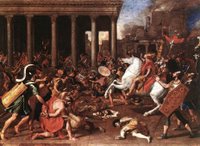 MacArthur then says on page 9 that he affirms that Jesus was talking about the destruction of the Temple and of Jerusalem in chapter 23. However, the questions from the disciples stem from the statements by Jesus in 23. MacArthur rejects audience relevance of what Jesus is saying and instead, like most dispensationalists, makes the passage speak to thousands of years into the future rather than the very plain understanding that Jesus was communicating, namely for that generation (24:34). To use Dr. MacArthur’s own words, he makes the text complex and enigmatic, not clear and encouraging.
MacArthur then says on page 9 that he affirms that Jesus was talking about the destruction of the Temple and of Jerusalem in chapter 23. However, the questions from the disciples stem from the statements by Jesus in 23. MacArthur rejects audience relevance of what Jesus is saying and instead, like most dispensationalists, makes the passage speak to thousands of years into the future rather than the very plain understanding that Jesus was communicating, namely for that generation (24:34). To use Dr. MacArthur’s own words, he makes the text complex and enigmatic, not clear and encouraging.Dr. MacArthur then takes the approach that everything in Matthew 24 is for sometime in the future, taking an approach that does not see Daniel’s 70 weeks as complete, but looking for some future Great Tribulation for physical Jews, of which I really question if that line is not completely mixed up. The reason for my thinking that is because no one can prove they are a physical descendant of Abraham: no one. All records were destroyed in the Temple during its destruction, this is one of the greatest reasons for believing Christ is who He said He was for Matthew and Luke record His genealogy for us so that we will know. Many speak of a rebuilt temple and the performing of sacrifices. The biggest question I have is who are the Levites? No one can prove it. No one is able to honestly come forward and prove they are from the tribe of Levi. What purpose would a new physical temple serve? After all, in the New Testament, believers are spoken of as the temple of the Holy Spirit and the church is also spoken of as a holy nation.
This helps us understand where Dr. MacArthur comes from. Before I give the particular example for our understanding of literal interpretation, I will quote MacArthur’s own words in regards to why he is a premillenialist.
“I believe the prophetic passages of Scripture should be handled like any other portion of God’s Word. The plain meaning of a text is the preferred interpretation. There’s no reason to spiritualize or devise allegorical interpretations of Scripture if the literal sense makes good sense. Only if the context of a passage gives some compelling reason to assume the language is symbolic should we look for figurative meaning. Where the plain sense of Scripture makes good sense, there is no reason to seek any other sense. (The Second Coming, John F. MacArthur, pgs 22-23)”
Now in the main I agree. We should not look for different meanings if the passage is clear. However, MacArthur and others have used the same thing that he says he doesn’t use in passages like Daniel 9:24-27. Therefore, he can have some future week, but in failing to understand the plain interpretation, he renders Christ’s work outside of the 70 weeks, not within them and then promises a holocaust that will make WWII pale in comparison for physical Jews as well as the whole world. He will also not take into account in Matthew 24 the apocalyptic language that will be used in some of the verses.
Particularly we will look at verse 29. From my perspective and I think from the perspective of Christ and His disciples, Jesus was referencing His coming judgment upon Israel, so when tribulation is spoken of there it is the same tribulation spoken of by Daniel in 12:1. Jesus fulfilled those things that the prophets said about Him. Notice the verse we are looking at, including verse 30:
“Immediately after the tribulation of those days the sun will be darkened, and the moon will not give its light; the stars will fall from heaven, and the powers of the heavens will be shaken. Then the sign of the Son of Man will appear in heaven, and then all the tribes of the earth will mourn, and they will see the Son of Man coming on the clouds of heaven with power and great glory.”
MacArthur takes this “literally”. In other words he believes that Jesus is saying that there will be great cosmic “stuff” happening. Again, he takes into his commenting on the passage “literal” interpretations of numbers from Revelation such as the 144,000. However, I believe that since he has missed the main point as I stated in the first part of the post, his interpretation will follow and be further from the truth rather than closer to it. However, we recognize that all of the Word of God comes from God, yet written by men. If so, would it not do us good to see how God used the same language in the past? When Peter uses similar language in 2 Peter 3:10-14 is he implying the end of the physical world, or is he speaking about the destroying of a world, namely the world of the nation of Israel? Let me demonstrate why I think we should not see this passage as literal, but having a literal meaning.
In the book of Isaiah, chapter 34, we find the prophet prophesying God's judgment upon Idumea and the nations of the world in the days of Assyria and Babylon.
1 Come near, you nations, to hear; And heed, you people! Let the earth hear, and all that is in it, The world and all things that come forth from it.
2 For the indignation of the LORD is against all nations, And His fury against all their armies; He has utterly destroyed them, He has given them over to the slaughter.
3 Also their slain shall be thrown out; Their stench shall rise from their corpses, And the mountains shall be melted with their blood.
4 All the host of heaven shall be dissolved, And the heavens shall be rolled up like a scroll; All their host shall fall down As the leaf falls from the vine, And as fruit falling from a fig tree.
5 "For My sword shall be bathed in heaven; Indeed it shall come down on Edom, And on the people of My curse, for judgment.
6 The sword of the LORD is filled with blood, It is made overflowing with fatness, With the blood of lambs and goats, With the fat of the kidneys of rams. For the LORD has a sacrifice in Bozrah, And a great slaughter in the land of Edom.
7 The wild oxen shall come down with them, And the young bulls with the mighty bulls; Their land shall be soaked with blood, And their dust saturated with fatness."
8 For it is the day of the LORD'S vengeance, The year of recompense for the cause of Zion.
9 Its streams shall be turned into pitch, And its dust into brimstone; Its land shall become burning pitch.
10 It shall not be quenched night or day; Its smoke shall ascend forever. From generation to generation it shall lie waste; No one shall pass through it forever and ever.
Now notice the language used by the prophet. Did the mountains actually melt with blood (vs. 3)? Did the host of heaven dissolve (vs. 4)? Were the heavens rolled up like a scroll (vs. 4)? And their host fall down (vs. 4)? Was a literal sword bathed in blood in heaven (vs. 5)? When verses 9-10 reference burning pitch and the fire not quenched night or day and the smoke rising up forever, was that meant literally? Did judgment take place? Yes it did. God did judge the people, but the language of the prophet is apocalyptic. I cannot read this as a historical narrative except that there was a real judgment of God. Otherwise, I would have to conclude that God brought an end to the physical realm and somehow restored it all including the people He didn’t judge, right? The prophet is simply using the picture of host of heaven and stars to refer to those who ruled over the people and their way of governing. The same seems to be true concerning the words of the Lord in Matthew 24. There was a total undoing of the governing of Israel to never be established again. Therefore, to them it would become a new world. You see this is apocalyptic language and both Jesus and John use it. They are familiar with how the Old Testament prophets spoke and they use the very same type of language. This is one of many examples that I could show that everyone, including those who say they take the texts literal, do in fact, on occasion not take things literally. However, even when they don’t, they usually have a literal meaning that they derive from the symbolism or the language. I do believe it also applies to numbers that are used in the Revelation as well. Though I think some numbers are more clearly to be taken at face value rather than at an exact, such as the number of the beast, for we are told that the number is there to give wisdom and that number is not three sixes, but rather is six hundred and sixty-six.
Also, let me point out the apocalyptic language of verse 30 of Matthew 24. You see that Jesus employees the same kind of language again in 26: 64,
Jesus said to him, "It is as you said. Nevertheless, I say to you, hereafter you will see the Son of Man sitting at the right hand of the Power, and coming on the clouds of heaven."
Interestingly enough Matthew, Mark, and Luke give the account of the Olivet Discourse. However John is the only gospel writer who does not include it in his gospel, but it appears that Revelation is his commentary on the Olivet Discourse. We will note that John also uses the same phraseology in chapter one of Revelation and verse 7.
Behold, He is coming with clouds, and every eye will see Him, even they who pierced Him. And all the tribes of the earth will mourn because of Him. Even so, Amen.
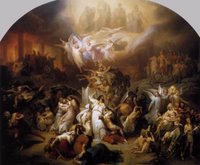 Notice that John speaks of Christ coming in the clouds and specifically references those who pierced him seeing this. This is obviously not for some people thousands of years in the future, but is in reference to the Lord’s own words of the generation that He spoke to. Thus John began the Revelation with,
Notice that John speaks of Christ coming in the clouds and specifically references those who pierced him seeing this. This is obviously not for some people thousands of years in the future, but is in reference to the Lord’s own words of the generation that He spoke to. Thus John began the Revelation with,The Revelation of Jesus Christ, which God gave Him to show His servants----things which must shortly take place. And He sent and signified it by His angel to His servant John, who bore witness to the word of God, and to the testimony of Jesus Christ, to all things that he saw. Blessed is he who reads and those who hear the words of this prophecy, and keep those things which are written in it; for the time is near.
He also references the fact that the tribes of the earth will mourn because of Him. Tribes is a better rendering than the AV gives. However, we will note that the Greek word here for earth is the same word used for “land”. This would give us a better understanding of the purpose of the book if we understand that it is concerning the judgment of the tribes in the land and that land is the area of Jerusalem.
Many, like Dr. MacArthur argue that when this “coming” happens that is referenced in Matthew 24 and that in Revelation 1 that what is referenced is a literal seeing with the eyes Jesus Christ in the clouds coming in judgment. Now that may or may not be. We are told by the angels in Acts 1:11 that Jesus would return in like manner. However, to better help understand this apocalyptic language; let’s look at how it was used in the Old Testament. After all there we find a basis for our hermeneutic in regards to the language.
God is referenced in the Old Testament as being surrounded by clouds as a picture of His holiness and righteous judgment (Gen. 15:17; Ex. 13:21-22; 14:19-20; 19:9, 16-19; Deut. 4:11; Job 22:14; Psa. 18:8ff.; 97:2; 104:3; Isa. 19: 1; Eze. 32:7-8). He is also poetically portrayed as coming in the clouds (Psa. 18:7-15; 104:3; Isa.19:1; Joel 2:1, 2; Nab. l:2ff.; Zeph. 1:14, 15).
Isaiah 19:1 is one of the passages that probably best illustrates the point. There we read,
The burden of Egypt. Behold, the LORD rideth upon a swift cloud, and shall come into Egypt: and the idols of Egypt shall be moved at his presence, and the heart of Egypt shall melt in the midst of it.
Now, did Egypt actually see God riding on a cloud? No. Did God judge Egypt? Yes. Again, the apocalyptic language helps us identify a literal meaning from the specific imagery used. This is part of the problem I see when someone says that something should be literally interpreted.
I still hold that the thousand years spoken of in chapter 20 of Revelation does not have to be taken literally in order to be understood. For if I am correct in assuming the early date of Revelation and that in fact speaks to God’s judgment upon Jerusalem, then it would make perfect sense to understand the thousand years to follow that time. With that in mind, I am also going to post some reasons regarding internal evidence for the early writing of Revelation. I am eager to hear from some who hold to a late date writing for Revelation (90-96 AD) and any internal evidence you might have. If you say it is because the church has always held to this then that is not internal evidence. That is not sola scriptura.
Thursday, December 01, 2005
Hunting & Reflecting on Creation, Redemption, & Eschatology

Be still, and know that I am God; I will be exalted among the nations, I will be exalted in the earth!

I reminded the boys of this. We pointed to the fact that God shows us even in creation that there is a time to die. The Fall and Winter comes and we see the once green leaves of the trees turn colors and fall to the earth. We see the bark of the trees become dry and crack and appear grey. We watch the flowers fade and die along with many other plants. We feel the stinging cold when we go outside and if we are paying attention it may seem that all is going to die and pass away.
However, when Spring comes and then Summer we see in the Creation a "resurrection to life". As the trees begin to put forth their buds and the plants begin to spring forth with life and color we are amazed at how they are able to do so.
We should marvel, for the One who brings them forth from the death of Fall and Winter also has called us, His people, forth from death unto life. We were without hope and helpless before God. Our future, to us, appeared desperate and hopeless, but Jesus spoke forth and called us from the grave of sin and death. In fact, He died in our place and we died with Him and He rose and we rose with Him. Our identity is not in the Church we attend, but is in the One who has placed us into His church: His body. We are united with Him in marriage and are His and He is ours. We are His bride and He is our husband.
The powerful God who made all things, brought us forth from death in sin to life and that more abundant in Jesus Christ. All praise be to His name for His unspeakable love and mercy!
I also took time to think in regards to the things I've been studying. I was hoping to hear more from some others concerning Daniel chapter 9. I believe if you believe that has been accomplished then there is no longer a need to discuss pre, post, mid, or pre-wrath rapture scenarios, for they are all based on the fact that the 70th week of Daniel is yet future, but I am still looking for the argument that it is future from the text itself. I believe now that the rapture will be that which occurs on the last day, the day of Christ's return. The more I meditate on these things the clearer it becomes that we are indeed in the kingdom just as the Scriptures say and that Jesus is King now and is ruling and reigning and that when He returns, He will indeed deliver the kingdom up to His Father. Most would not question the idea that Christ is indeed reigning as King of kings, however, some may ask are we living and reigning with Christ now. Fair question. Let me answer it by stating clearly that the ones living and reigning with Christ are those who have gone before us. Look at the text.
And I saw thrones, and they sat on them, and judgment was committed to them. Then I saw the souls of those who had been beheaded for their witness to Jesus and for the word of God, who had not worshiped the beast or his image, and had not received his mark on their foreheads or on their hands. And they lived and reigned with Christ for a thousand years.
Notice it is the ones who have been beheaded for their witness to Jesus and for the word of God along with those who have not worshipped the beast or his image and have not received his mark. Those are the ones specifically addressed in the passage. They reign during the millenium. I do believe the millenium defines this period since the ascension of our Lord till the time of His bodily return on the last day to judge all men.
Now, I have already gone longer in this particular post than I wanted to, but I want to call upon all my reformed brothers who take the "pan" millenial approach. I once called the ministry of a well known apologist, a man I have deeply respected and learned from over the years to hear that escahatology and these things were not important and they really didn't impact anything. They were those whose eschatology was "It'll all pan out in the end." To me, this should not be the attitude of those involved in defending the faith. I believe we should defend the gospel and brothers, the gospel contains aspects of eschatology. Did Jesus really bind the strongman(Matt. 12:29; Luke 11:21; Mark 3:27)? Did He really crush Satan's head (Gen. 3:15)? Did He really disarm principalities and make a spectacle of them and triumph over them(Col. 2:15)? I could go on and ask other questions, but these seem to be tied to the work of Christ at the "time of the end".
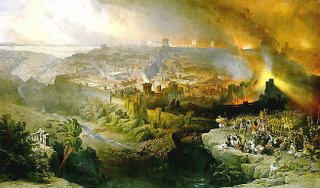
Brothers, eschatology does matter!
I can see already how my former teachings gave me a vision of a darkened pitiful future. Now I am beginning to see the glory of the reigning King of kings. I see the crushing of the serpents head MORE clearly now and am gaining understanding in this area of theology. I am not one who thinks that these things are incomprehensible. I believe they are very much like the doctrines of grace. They need to be approached from Scriptures (in their contexts and the contexts of the books they are written in) and with a genuine interest to learn and understand. Let us not just disagree with a particular view because we don't understand it. Let us be willing to learn from those who have gone before us and understand the reasoning behind the eschatology and then we will be better equipped to hold fast the truth or discard the error concerning eschatology.
Remember we must not be silent on the issue of eschatology just be cause we don't understand it all. It is doctrines which we must understand and use to fight back the enemy of dispensationalism, which brings harm to true Christian doctrine, for in its purist form it presents different paths of salvation for different people at different times in history. The gospel is at the heart of eschatology. May God grant us understanding and perseverance to grasp these thruths from His word.
Thursday, November 24, 2005
Jesus Bowl Sunday

I will be writing my thoughts on the season of Christmas in the future. For now, suffice it to say our family has struggled with the reality of what the season actually it, what it came from and what it claims to be. We have thus decided to try and distance ourselves from the celebration as much as possible. I found the following article to be a great metaphor concerning the season. I would love to hear your comments.
This sign already gives us a picture into the future. Mr. Degenhart takes us there.
Jesus Bowl Sunday
Sunday, November 20, 2005
A Coin in the Middle of the Room
I had been reading the Scriptures for about three years when problems like the one you've presented started to multiply in front of me. Before that, it was easy to play "The Either-Or Game" and dismiss one side or the other in favor of the aspect I'd already learned and come to appreciate. Our dismissing of one element of truth usually happens when we trim it down to "make it fit" with another. In some cases, the Bible's teaching is so hacked and hewed when we've finished with it, that it is almost unrecognizable. With some, human responsibility can become 'no responsibility', and, with others, divine election becomes 'divine reaction'.
The history of doctrinal debate in the Church is chock full of examples where one party stood for one side of truth, and another group took the other side.Truth, like a coin held up in the middle of a crowded room for all to see -- some from a better angle than others, some at closer proximity than others -- then becomes the subject of intense debate between the cliques which have formed inside the room. One argues that 'heads' is revealed on the surface of the coin. Another, aghast on the other side of the room, reply that 'tails' is so obvious it cannot be missed, except by the totally blind! Precious few souls take enough time and effort to stand up and move through the crowd in order to acquaint themselves better with the coin. The crowd impatiently wonders why these meticulous few must disturb the room by moving around so much. "Just take one look at the coin, and you'll see what's on it! Besides, our forefathers have already told us what's on the coin, so you needn't really even look." Later, when those few eventually have an opportunity to speak, they confess their increasing conviction that the coin has BOTH a heads side AND a tails side. "What?! How absurd! That's impossible, irrational. Just look at the coin: how many images do you see?!" The ensuing din drowns out the voices of the few, and the crowd goes on debating, century after century, oftentimes the same points of doctrine.
More or less, that's the history of the Church in its' more controversial moments. In every age, men like Augustine and Aquinas and Calvin saw and confessed both sides, and were therefore misunderstood on all sides. They were repeatedly accused by one group of holding their opponents' error, and then accused by the other group of erring with the first group!
Anyway, for myself, I passed three or four years paring down certain doctrines to fit others. At the same time, however, I was moving slowly around the room in order to observe better this coin of such great importance. Slowly, observing the coin while listening to the people from this or that clique, I began to see the underlying pattern. Truth is two-sided from our human perspective -- a principle which touches nearly every doctrine revealed in the Scriptures. It is certainly NOT a grid through which to read the text of Scripture, but it IS a very helpful tool for understanding and interpreting the Scriptures. Once grasped and appreciated, it becomes much easier for the reader to move with the Sacred Text, wherever it might lead him. You'll be gloriously surprised at how easily things start to fall together, and how erstwhile problems begin to disappear.
Saturday, November 19, 2005
Adrian Rogers, Paige Patterson and the upcoming Calvinism debate
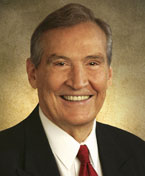
I wanted to make just a few comments on 2 items that I read about this week. First, on November 15th Dr. Adrian Rogers went home to be with the Lord. Dr. Rogers was greatly used of God during his ministry. He was a gifted orator and a leader in the SBC, even elected president of the SBC on 3 different occasions. I recall meeting him at a couple of pastor's conferences when I was young in the faith and was in awe of this man. He had a gentle, yet somehow firm personality. I grew to disagree with the particulars of his preaching against the doctrines of grace over the past years, but always had respect for a man that labored hard over the inerrancy issue so many years ago. He is to be commended and remembered for how God used him in ministry. I will miss hearing his deep velvety voice, that many referred to when they called him "the prince of preachers". Today, we enjoy the some of thefruits of his and others labors in the SBC. I for one grew up in a SBC church with a father who is an SBC pastor and am truly thankful that my father stood shoulder to shoulder with men like Dr. Rogers. Truly, we should thank God for using men like Adrian Rogers to bring the SBC back out of the pit of liberalism. My sympathy is with the family in their loss and we look forward to being with Adrian around the throne when we will all be in the complete unity of the faith before our gracious God.

 Second, I have heard the news concerning the supposed "debate"/ formal discussion/ speaking engagement/ etc. etc. between Drs. Mohler and Patterson. I welcome this. I also think it is great that it will be out in front of an audience. This is wonderful news. I know both men are gentlemen and that both seem to have the highest integrity, so it should be very cordial and should be very straight forward. I don't expect their minds to be changed, though I pray that Dr. Patterson would see the error in his doctrine. However, I hope it will be an example of how brothers in Christ should dialogue with one another in love and confront one another with the Scriptures, spurring one another on to the truth.
Second, I have heard the news concerning the supposed "debate"/ formal discussion/ speaking engagement/ etc. etc. between Drs. Mohler and Patterson. I welcome this. I also think it is great that it will be out in front of an audience. This is wonderful news. I know both men are gentlemen and that both seem to have the highest integrity, so it should be very cordial and should be very straight forward. I don't expect their minds to be changed, though I pray that Dr. Patterson would see the error in his doctrine. However, I hope it will be an example of how brothers in Christ should dialogue with one another in love and confront one another with the Scriptures, spurring one another on to the truth.I can say that I have run across many men of God who have been an encouragement to men throughout the blogosphere. Even now there are issues that we disagree on, but they love me anyway and I love them and we continue to dialogue trusting that the same sovereign God that saved us and caused us to have some understanding of His electing grace towards us will also teach us in these other areas where we disagree. Our sanctification is at different levels. We were all saved at different times and out of different circumstances and from different backgrounds with different levels of biblical knowledge. Can we really expect every Christian to be completely on the same page? I don't think so. However, I do expect that every Christian should be moving in the same general direction: holiness and sound doctrine. Can I get an amen?!!
Something Funny
Anyway with this handy link, all your favorite websites can instantly be read in redneck, jive, Elmer Fudd, etc. The list goes on. It can be extremely funny. Check it out for yourself. Enjoy it with the relatives this coming week.
CLICK HERE to read this here blog in the redneck dialect.
Tuesday, November 15, 2005
My Thanks to Douglas Bond

My thanks go to Douglas Bond for a wonderful tale. We just finished up the first installment of Douglas Bond's Crown and Covenant series. This first book is called Duncan's War. We have been reading it to the children in the evenings. Duncan is just a young lad and one of the bairn (that's Scottish for children) of Sandy M'Kethe. The year is 1666 and the English have decided to oppress the Scottish Covenanters, those famous believers who held fast to Christ and His Kirk.
Duncan, though just a boy is taught many a lesson of how to trust in God, though his passions are clearly pointing him to trust in his own strength and emotion. His father, a godly man is not fond of war, but has no problem in taking up his claymore to fight off some dragoons who are torturing and about to kill an old man, who happens to be a friend to him. In doing so, much happens that brings the English to come and seek to destroy the Covenanters in the little village that Duncan lives in and in the surrounding areas. His father is captured by the English during one of the battles and it is up to Duncan to rescue his father. This is Duncan's War.
I won't tell you everything, just in case you might want to read it. Beware, it is filled with Scottish lingo. There's even a glossary at the back in case you don't ken (that's Scottish for "know") what the writer is talking about. It also helps to have a good Scottish accent when reading to the kids:) We are eagerly awaiting the next installment, King's Arrow and then the final volume, Rebel's Keep. These three volumes are available from our bookstore. Though they are fiction, they are filled with accounts of real battles from history and real historical figures who "overcame him by the blood of the Lamb, and by the word of their testimony; and they loved not their lives unto the death." If you or your children like G. A. Henty, let me recommend the Crown and Covenant Series to you.
Sunday, November 13, 2005
Heads up on a new video critique of Dispensationalism
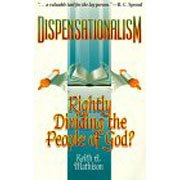
I just finished up a book that I picked up at the apologetics conference last month. It is titled "Dispensationalism-Rightly Dividing the People of God?". This book is written by Keith Mathison and published by Presbyterian and Reformed in 1995. I thoroughly enjoyed the book. It is written in such a way that gets to the main points of dispensationalism and is easy to read. Many of the conclusions Mathison brings out I have come to and many he clarified for me. I would highly recommend it for anyone interested in the subject. You can pick it up at our bookstore by clicking the icon above.
 I also wanted to let you know about a new video in the works. I spoke with Jerry Johnson (co-author of the Amazing Grace DVD) this week. He is in the process of researching the subject and the Apologetics Group is in process of putting together a script for a new video on dispensationalism titled, "The Late Great Planet Church". I am sure it will be a video that will pick a lot of fights, but I hope God will use it in such a way as He has the Amazing Grace DVD.
I also wanted to let you know about a new video in the works. I spoke with Jerry Johnson (co-author of the Amazing Grace DVD) this week. He is in the process of researching the subject and the Apologetics Group is in process of putting together a script for a new video on dispensationalism titled, "The Late Great Planet Church". I am sure it will be a video that will pick a lot of fights, but I hope God will use it in such a way as He has the Amazing Grace DVD.Finally, be on the look out within the next month for our new video, "Marks of a Cult", also by the Apologetics Group.
Eschatology continues.........Daniel 9

Well, I said I would try to get some of the info from my Daniel study up from chapter 9. I have been delayed:) Even now, I am a bit sick, but God is good in His providence to allow me opportunity to blog. With that in mind, I believe that during some of my study and past experience that Daniel chapter 9 is a critical hinge for those who are dispensationalists. They say this because they do not see a continuous flow of the true Israel throughout the Old and New Testament. They see Israel as distinct from the church. I may use another post to comment on my understanding of that later. Suffice it to say, that I believe there is natural or national Israel. This is the nation composed in the Old Testament and even into the New Testament. National Israel was comprised of believers and unbelievers. This was also true in Daniel's time as well. Second there within the bounds of national Israel was a remnant, True Israel. This is the distinction that Paul makes in Romans 9-11. The unbelieving Israelites were "cut out" and the Gentiles (of which I am one), were grafted into the olive tree. Therefore, Gentile believers enter into the kingdom of God just as Jewish believers: by grace through faith in Jesus Christ. They are both put into the vine of the Lord Jesus Christ by His sovereign will.
However, in Daniel 9 we see that Daniel is not including Gentile believers, but is confessing his sin and the sins of his people (the nation Israel). The prophecy concerning the 70 weeks is that which centers around his people (national Israel) & the holy city, Jerusalem (vs. 24). The 70 weeks are literally 70 7's. In the law of Moses every 7th year was considered a sabbath and every seventh day was considered the Sabbath. Also we will note the Leviticus 25 points out to us the year of Jubilee, which was a picture of redemption. There would be seven 7 year sabbaths occurring before the year of Jubilee in which slaves would be freed, debts eliminated and a celebration. That would be after a period of 49 years. Daniel's prophecy gives us a complete picture of redemption found in the Messiah, for his prophecy equals 490 years.
Let us note 6 things that are to be accomplished in the 70 weeks.
- To finish the transgression
- To make an end of sins
- To make reconciliation for iniquity
- To bring in everlasting righteousness
- To seal up vision and prophecy
- And to anoint the Most holy
Remember that Daniel has been engaged in prayer is confession of Israel’s sin. This is concerning time to finish their transgression. God has been patient with this people, but there will come a time when their sins will come to the full, just as God did with the Amorites (cf. Gen 15:16). Thhis is the time of the rejection of the Messiah and their cries for the crucifixion of the Christ, in which they called down a curse upon themselves and their children. Thus Jesus upon His going to the cross told the women not to weep for themselves, but for their children, because of the judgment that would fall upon them.
The Hebrew word used here is chatham and means, “to seal up sin”.It carries the idea of "reserving their sin for judgment". God even gave them a generation to repent. But they continued in their sin and continued to persecuted the followers of the Messiah.
The Hebrew word here is kaphar and means, “atonement”. Only one atonement can be in view here. It is the death of Christ. Christ is the one in view. While verse 24 speaks of the results of the 70 weeks, the continuing verses speak to how these things are accomplished.
The Bible teaches us in numerous places that Christ brings to those who are His everlasting righteousness. Let us see just 2 examples.
Hebrews 9:12 “Neither by the blood of goats and calves, but by his own blood he entered in once into the holy place, having obtained eternal redemption for us.”
Again the Hebrew word used here is the same as before chatham . The stem indicates that it is Christ who puts His seal on prophecy. He is the One who fulfills the prophecies presented here and throughout the Old Testament. In other words, Christ authenticates the prophecies concerning the Messiah.Look at these passages:
Luke 24: 44 Then He said to them, "These are the words which I spoke to you while I was still with you, that all things must be fulfilled which were written in the Law of Moses and the Prophets and the Psalms concerning Me." 45 And He opened their understanding, that they might comprehend the Scriptures. 46 Then He said to them, "Thus it is written, and thus it was necessary for the Christ to suffer and to rise from the dead the third day, 47 "and that repentance and remission of sins should be preached in His name to all nations, beginning at Jerusalem. 48 "And you are witnesses of these things.
This is not a reference to the Temple. All of this passage concerning the 70 weeks are about the Messiah. He is the central character. The things to be accomplished in verse 24 are pointing to the Messiah. Is it Christ’s baptism? Some say it is His baptism when He is presented as Messiah. This may be true. Anointing in the Old Testament happened usually prior to one ascending to the throne. However, it could also speak to His coronation at His ascention, when He went to His Father and received His kingdom (cf. Dan. 7:13-14). Jesus is also referred to that Holy thing or holy one in regards to Gabriel's words to Mary in Luke 1:35.
We are then told specifically when these 70 weeks are to begin. Remember that Daniel has been studying Jeremiah and has come to the conclusion that Jeremiah declared that the people would be in bondage in Babylon for 70 years and Daniel knows that the time is near for their release. Now he hears the time that the 70 weeks will begin. From the time of the command to restore and build Jerusalem till Messiah the Prince will be 7 weeks and 62 weeks. This is 7x7=49 and 62x7=434, for a total of 483 years. This decree is not the decree we read about form Cyrus in Ezra 6-7, for that decree was the release of the Jewish people, not a command to rebuild Jerusalem.
This is the command of Artaxerxes in Neh. 2:1-8. It seems this is the indication of the separation of weeks. Thus it is possible that the 7 weeks refers to the troublesome times of rebuilding Jerusalem (ie. 49 years). This did happen in the times of Nehemiah (SEE Neh. 4:1-18). This occurred in the year 457 BC.
The next 62 weeks are clearly to lead up to the time of Messiah. This is quite possibly the time of His baptism. This would be when His ministry would begin openly as the Messiah. These 62 weeks may also be closely connected with the time that there were no prophetic words from the Lord (ie. The inter-testament time).
We will notice that the results of the 70 weeks are not a part of dispensational theology, for verse 26 tells us that the Messiah is cut off after the 69th week. If He dies after the 69th week, but not in the 70th week, then one is clearly going outside the text for an interpretation. I believe the 70th week continues from the 69th. For Christ arrives at His baptism being about 30 years old and we can count the years of His ministry by the feasts that are mentioned. Therefore, we conclude that His ministry was 3 1/2 years. This is important in regards to the following verses. Messiah is not cut off (killed) for Himself, but for His people. The word used for cut off is karath. It means, “to cut, cut off, cut down, cut off a body part, cut out, eliminate, kill, cut a covenant”. Quite literally Jesus was killed and in His death He confirmed a coveant with "many".
Now, I must confess the only parts that give me difficulty are the parallels of verses 26 and 27. First let me say that we are told of the judgment upon Jerusalem. that is clear. Notice that it is the people of the prince who is to come who will destroy the city. We know from history that this refers to the Romans. Some will say that verse 27 then points back to the prince of verse 26. However, we will note that the prince is not the subject and that he is merely mentioned in a phrase. If they wish to point back to that phrase, they must point to the people of the prince.
Verse 27 tells us that "he" will confirm a covenant with many for one week (7 years) and in the midst of that week he will bring an end to sacrifices and offerings. Well, I really am not familiar with where Antichrist is to make such a covenant, unless someone points specifically to this verse. However, the Old and New Testament is clear. Christ confirmed a covenant with many. The Scriptures are full of evidence. Before quoting some of them, let me note that though the sacrificial system went on for 40 more years after His death, it became Satanic in the fact that it was no longer valid. The writer of Hebrews warned his hearers to beware of returning to such things for they would be trampling under their feet the blood of the Son of God. Jesus caused that system to cease. Let us note the many verses that speak to Christ's confirmation of the covenant:
Luke 1: 68 "Blessed is the Lord God of Israel, For He has visited and redeemed His people,69 And has raised up a horn of salvation for us In the house of His servant David,70 As He spoke by the mouth of His holy prophets, Who have been since the world began,71 That we should be saved from our enemies And from the hand of all who hate us,72 To perform the mercy promised to our fathers And to remember His holy covenant,73 The oath which He swore to our father Abraham:74 To grant us that we, Being delivered from the hand of our enemies, Might serve Him without fear,75 In holiness and righteousness before Him all the days of our life.76 "And you, child, will be called the prophet of the Highest; For you will go before the face of the Lord to prepare His ways,77 To give knowledge of salvation to His people By the remission of their sins,78 Through the tender mercy of our God, With which the Dayspring from on high has visited us;79 To give light to those who sit in darkness and the shadow of death, To guide our feet into the way of peace."
Hebrews 7: 22 by so much more Jesus has become a surety of a better covenant.
Isa 42:6 "I, the LORD, have called You in righteousness, And will hold Your hand; I will keep You and give You as a covenant to the people, As a light to the Gentiles,
Isa 53:11 He shall see the labor of His soul, and be satisfied. By His knowledge My righteous Servant shall justify many, For He shall bear their iniquities.
Isa 55:3 Incline your ear, and come to Me. Hear, and your soul shall live; And I will make an everlasting covenant with you--The sure mercies of David.
Jer 31:31 "Behold, the days are coming, says the LORD, when I will make a new covenant with the house of Israel and with the house of Judah--32 "not according to the covenant that I made with their fathers in the day that I took them by the hand to lead them out of the land of Egypt, My covenant which they broke, though I was a husband to them, says the LORD.33 "But this is the covenant that I will make with the house of Israel after those days, says the LORD: I will put My law in their minds, and write it on their hearts; and I will be their God, and they shall be My people.34 "No more shall every man teach his neighbor, and every man his brother, saying, `Know the LORD,' for they all shall know Me, from the least of them to the greatest of them, says the LORD. For I will forgive their iniquity, and their sin I will remember no more."
Jer 32:40 `And I will make an everlasting covenant with them, that I will not turn away from doing them good; but I will put My fear in their hearts so that they will not depart from Me.41 `Yes, I will rejoice over them to do them good, and I will assuredly plant them in this land, with all My heart and with all My soul.'42 "For thus says the LORD: `Just as I have brought all this great calamity on this people, so I will bring on them all the good that I have promised them.
Eze 16:60 "Nevertheless I will remember My covenant with you in the days of your youth, and I will establish an everlasting covenant with you.61 "Then you will remember your ways and be ashamed, when you receive your older and your younger sisters; for I will give them to you for daughters, but not because of My covenant with you.62 "And I will establish My covenant with you. Then you shall know that I am the LORD,63 "that you may remember and be ashamed, and never open your mouth anymore because of your shame, when I provide you an atonement for all you have done," says the Lord GOD.'"
Mt 26:28 "For this is My blood of the new covenant, which is shed for many for the remission of sins.
Ro 15:8 Now I say that Jesus Christ has become a servant to the circumcision for the truth of God, to confirm the promises made to the fathers,9 and that the Gentiles might glorify God for His mercy, as it is written: "For this reason I will confess to You among the Gentiles, And sing to Your name."
Ga 3:13 Christ has redeemed us from the curse of the law, having become a curse for us (for it is written, "Cursed is everyone who hangs on a tree"),14 that the blessing of Abraham might come upon the Gentiles in Christ Jesus, that we might receive the promise of the Spirit through faith.15 Brethren, I speak in the manner of men: Though it is only a man's covenant, yet if it is confirmed, no one annuls or adds to it.16 Now to Abraham and his Seed were the promises made. He does not say, "And to seeds," as of many, but as of one, "And to your Seed," who is Christ.17 And this I say, that the law, which was four hundred and thirty years later, cannot annul the covenant that was confirmed before by God in Christ, that it should make the promise of no effect.
Heb 6:13 For when God made a promise to Abraham, because He could swear by no one greater, He swore by Himself,14 saying, "Surely blessing I will bless you, and multiplying I will multiply you."15 And so, after he had patiently endured, he obtained the promise.16 For men indeed swear by the greater, and an oath for confirmation is for them an end of all dispute.17 Thus God, determining to show more abundantly to the heirs of promise the immutability of His counsel, confirmed it by an oath,18 that by two immutable things, in which it is impossible for God to lie, we might have strong consolation, who have fled for refuge to lay hold of the hope set before us.
Heb 8:8 Because finding fault with them, He says: "Behold, the days are coming, says the LORD, when I will make a new covenant with the house of Israel and with the house of Judah----9 "not according to the covenant that I made with their fathers in the day when I took them by the hand to lead them out of the land of Egypt; because they did not continue in My covenant, and I disregarded them, says the LORD.10 "For this is the covenant that I will make with the house of Israel after those days, says the LORD: I will put My laws in their mind and write them on their hearts; and I will be their God, and they shall be My people.11 "None of them shall teach his neighbor, and none his brother, saying, `Know the LORD,' for all shall know Me, from the least of them to the greatest of them.12 "For I will be merciful to their unrighteousness, and their sins and their lawless deeds I will remember no more."13 In that He says, "A new covenant," He has made the first obsolete. Now what is becoming obsolete and growing old is ready to vanish away.
Heb 9:15 And for this reason He is the Mediator of the new covenant, by means of death, for the redemption of the transgressions under the first covenant, that those who are called may receive the promise of the eternal inheritance.16 For where there is a testament, there must also of necessity be the death of the testator.17 For a testament is in force after men are dead, since it has no power at all while the testator lives.18 Therefore not even the first covenant was dedicated without blood.19 For when Moses had spoken every precept to all the people according to the law, he took the blood of calves and goats, with water, scarlet wool, and hyssop, and sprinkled both the book itself and all the people,20 saying, "This is the blood of the covenant which God has commanded you."
Heb 9:28 so Christ was offered once to bear the sins of many. To those who eagerly wait for Him He will appear a second time, apart from sin, for salvation.
Heb 10:16 "This is the covenant that I will make with them after those days, says the LORD: I will put My laws into their hearts, and in their minds I will write them,"17 then He adds, "Their sins and their lawless deeds I will remember no more."18 Now where there is remission of these, there is no longer an offering for sin.
Heb 13:20 Now may the God of peace who brought up our Lord Jesus from the dead, that great Shepherd of the sheep, through the blood of the everlasting covenant,21 make you complete in every good work to do His will, working in you what is well pleasing in His sight, through Jesus Christ, to whom be glory forever and ever. Amen.
The truth is that Anti-Christ is never mentioned as confirming a covenant with God’s people. However, the Messiah is constantly affirmed in both testaments that He is the one confirming the covenant. Christ is the one who causes the sacrifices to cease. This happened in the midst of the final week. This is in fact His crucifixion, death, burial, and resurrection. The final destruction of Jerusalem is seen past the 70 weeks until the consummation is poured out on the desolate. This speaks of the destruction of the temple by the Roman armies.
Some will ask me when I think the 70 weeks ended. No doubt you've been wanting to hear that as well. To be perfectly honest, I don't know what the particular event would be, but I have some thoughts. It could be when Peter was sent to Cornelius, he being the first named Gentile that the gospel went to after Christ's ascention. Remember that the disciples were to begin in Jerusalem and then make their way into Judea and Samaria and the utter most parts of the earth. However, it may be safer to assume that at the stoning of Stephen we see the utter rejection of the message of the gospel. While many of the same men from the Sanhedrin were involved in the death of Christ, these same men put to death Stephen after a glorious exposition of the Scriptures and a stinging indictment of them and their sin. Stephen's account also gives us an insight into Christ standing to received Him and leads into the dispersion from Jerusalem and the conversion of the apostle Paul, the apostle to the Gentiles. I think this event is a more likely candidate.
Monday, October 24, 2005
Eschatology.....past, present, future?
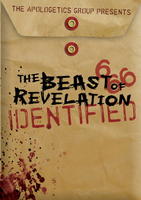
I know Steve Camp is thinking of blogging on eschatology and I may do more of it in the future, but I thought I would put down some thoughts concerning materials I have been going over the past year or so. Let me say at the outset, that I may have some mixed views of the subject, but one thing I am not is a dispensationalist. I have recently become acquainted with the preterist view. The preterist view believes that those things found in Daniel, Matthew 24, and Revelation, as well as, many other Scriptures have already been fulfilled by 70 A.D. I come from a SBC church and we were taught the whole Tim LaHaye kind of stuff, which was a premillenial dispensationalist type of eschatology. I no longer hold to such a view. However, my studies seemed to follow the path of the reformers in what might be called a historicist view.
While a historicist and preterist do cross over one another they are distinct. Let me note that not all preterists are full preterists. Some preterists are partial preterists. They are those who believe the majority of things found in the above passages are fulfilled with still some future events to take place, while full preterists believe that all things are fulfilled and even Christ's return is not yet future. This I believe is heretical (full preterism). However, much of the preterists arguments answer a lot of questions, though they pose some as well. I have long held that Matthew 24 was mostly about the destruction of Jerusalem, but also felt there was a gap as Jesus answered the question concerning the end of the age and His coming. Most partial preterists, like Ken Gentry, will think like that as well. However, many will say that the return spoken of in Matt 24 is pertaining to Christ's coming in judgment and that the end of the age is indeed that of dealing with national Israel. In fact Gentry goes on to say that it is pictured as God "stoning her" for her adulteries and therefore taking to Himself His bride the church.
I am convinced more than ever that our eschatology does guide our thinking in the present. While I don't believe it is something I would withhold fellowship over, it is important. I welcome anyone's comments that might add to my understanding.
Tuesday, October 18, 2005
Children..... Teaching them to defend the Faith Pt. 2

It certainly has been a while since I sat to type. I had such a lapse in our work schedule that it sort of spoiled me. I am grateful to God for that though. It was nice not to be so rushed for about a month.
I wanted to continue some of my thought regarding teaching children. In the last post I was trying to remind myself of two things: make children familiar with the Scriptures and help them form their thinking, attitudes and overall practice according to those things they learn from Scripture. This must be the overriding principle of any Christian, not just children.
However, there must also be depth to our children's understanding. Familiarity with Scripture is good, must it must become deep familiarity. To many today are familiar with the Scripture enough to twist it (and by that I don't mean intentionally). Many are good Baptist brethren. Many are good Presbyterian brethren. Some can play "Bible ping-pong" better than most Jehovah's Witnesses I know. Context should always determine our understanding of a passage of Scripture. On top of that we should always direct ourselves and our children to an understanding of what is said in its immediate context and in the context of what the particular book has said. This is where I find homeschooling most appropriate, because we read all sorts of books. We learn context from all types of writings. Therefore, we want our kids to come to the Bible with the understanding that God wrote it to men so that they might understand what He has said, not try and figure out mystical codes and change His thoughts around with the "ping-pong" scenario.
Therefore, I find that reading the books of the Bible in context all the way through is good for developing that kind of context. Also, the preaching and teaching of churches should be expositional in nature. I realize that at times a particular subject will be addressed and that is fine, as long as, when verses are given there is a context that is always established. Too often I have heard people use verses completely out of context to make their point and sadly they are men who should know better.
Some will be offended I realize at this, but I do believe that a catechism is a good method to use in teaching right doctrine and context. When we taught it in the church and to our children, we took the issues very seriously and were transformed by them. We get the idea for catechism from three verses in the New Testament. First Corinthians 14:19 Paul says, "In the church I would rather speak five words with my mind, in order to INSTRUCT others, than ten thousand words in a tongue." In Galatians 6:6 he says, "Let HIM WHO IS TAUGHT the word share all good things with HIM WHO TEACHES." Acts 18:25 says that Apollos "has been INSTRUCTED in the way of the Lord."
In each of these verses the Greek word for "instruct" or "teach" is katecheo. From this word we get our English word "catechize". It simply means to teach Biblical truth in an orderly way.
Catechisms, for those not familiar, are simply a way of memorizing doctrines and why they are doctrines. A question is asked and then an answer is given. Following the passages of Scripture must be looked to not to some how pull out a doctrine you have made up, but to establish the reason the doctrine exists in the first place. During those times it is important to understand the context of those passages referenced, for their are many times where that will become clearly relevant to the learner. Children are most adept to this kind of learning, as well as, adults. It simply takes time and repetition. Remember how you learned your favorite song? By hearing it over and over and over again. The catechism works the same way. It engrains upon their minds the truth of God's word.
 I recall my oldest, Tori, learning the first 25 questions and answers in just a few weeks. It was sort of funny too because she was pronouncing these enormous words at age 2. God has given our children incredible learning capacity. Therefore, we don't need to dumb them down. We need to encourage them to go on beyond where they are. I realize that every parent is at a different stage, but the important thing is to begin and pray that God would keep us consistent and add grace not only where we are not consistent, but where we are.
I recall my oldest, Tori, learning the first 25 questions and answers in just a few weeks. It was sort of funny too because she was pronouncing these enormous words at age 2. God has given our children incredible learning capacity. Therefore, we don't need to dumb them down. We need to encourage them to go on beyond where they are. I realize that every parent is at a different stage, but the important thing is to begin and pray that God would keep us consistent and add grace not only where we are not consistent, but where we are.In our day and age the training of our children is more important than ever. If we really are desirous and asking God for revival in our land, He will more than likely do it through the generation that we are seeing come up today. I pray that He might see fit to use my little ones in such a way. How our nation needs to repent and turn back to God. Let us, as the people of God, repent and turn again to our Lord and may He "turn the hearts of the fathers to the children... to make ready a people for the Lord." -- Luke 1:17




